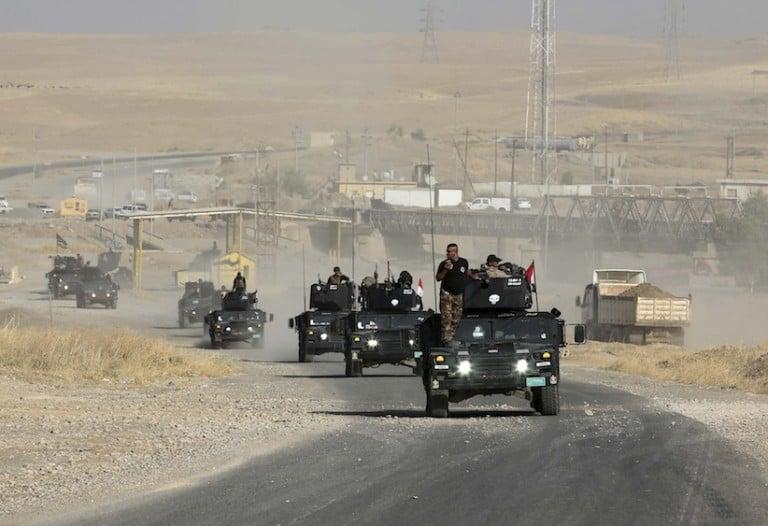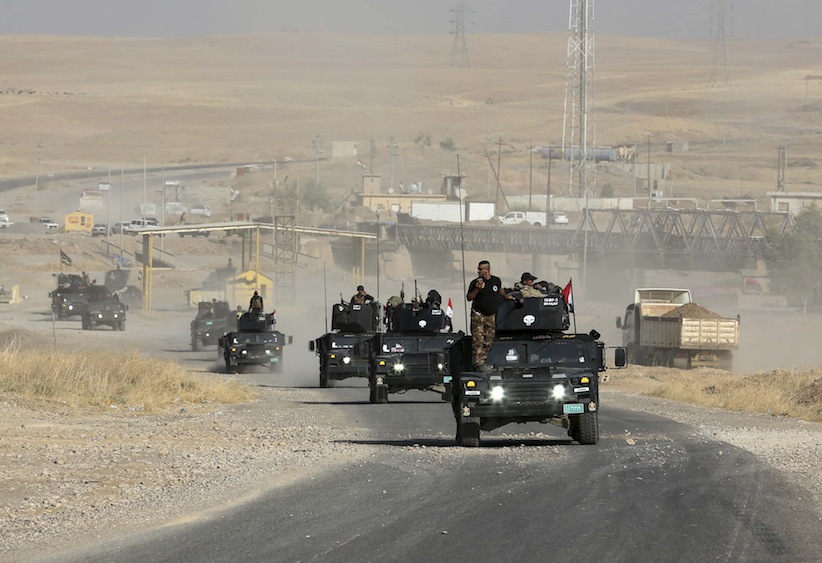The dangers in the fight for Mosul
Taking the Iraqi city from Islamic State will likely be easier than expected, but bringing peace to Mosul will prove elusive

Iraqi special forces advance towards the city of Mosul, Iraq, Wednesday, Oct. 19, 2016. A senior Iraqi general on Wednesday called on Iraqis fighting for the Islamic State group in Mosul to surrender as a wide-scale operation to retake the militant-held city entered its third day. (AP Photo/Khalid Mohammed)
Share

If we’re to believe the hype, Monday was the day the most significant assault on the withering Islamic State began. A coalition of 30,000 troops stitched together from Kurdish forces, the Iraqi military, Shia, Christian and Turkmen militias, some backed by the U.S. others by Turkey and still others by Canada launched what has been billed as the mother of all battles to retake the sprawling Iraqi city of Mosul.
It’s been a long time coming. Over the past year, the elusive Mosul offensive has become short-form for all of the challenges Iraq faces as it struggles to define itself nearly a decade and a half after the U.S.-led invasion that toppled the Saddam Hussein regime. When the city fell to rampaging Islamic State militants in June 2014, it was evidence of the weakness of the Iraqi army and the failures of Iraq’s leaders to create a unified country. Since then, retaking Mosul has come to symbolize U.S. President Barack Obama’s overarching Middle East strategy. The U.S. would not, his argument goes, try to save Iraq, or any other Middle Eastern nation. Iraqis would have to save themselves.
Mosul will be the first major test of how successful that policy has been. Clearly it’s not only about defeating Islamic State and burying its self-declared caliphate. That process has been on going for months. More important is how the coalition arrayed against ISIS will function on the battlefield, and how much it will co-operate once the fighting is over.
Here’s how volatile the situation is:
Kurdish fighters, commonly referred to as peshmerga but made up of a variety of Kurdish forces with differing loyalties, are marching on Mosul from the east. At the forefront of these fighters, according to a Kurdistan Regional Government spokesperson, are the Canadian-trained Zeravani, a commando unit loyal to Kurdistan’s Barzani family. It has led many of the offensives over this past summer, pushing Islamic State out of villages surrounding Mosul. Brig.-Gen. Peter Dawe, the commander of Canada’s JTF2 special forces, admitted in early October that his troops have increasingly joined the Zeravani on the frontlines, occasionally trading fire with Islamic State fighters.
The Kurds have little interest in Mosul City itself but are keen to secure its surrounding countryside. It was from the scattered villages there that Islamic State first advanced to the outskirts of the Kurdish capital Erbil in August 2014. The Kurds have vowed to not let that happen again. In a telling moment on Monday, the General Command of the peshmerga announced its forces had retaken nine more villages from Islamic State control before abruptly halting their advance.
“We are just holding our positions,” Col. Khathar Sheikhan, a frontline commander, told reporters. “We have achieved our objectives.”
Iraqi army commandoes preparing their own advance were caught by surprise, local media reported. Their commander, Brig. Gen. Haider Fadhil, denied the Kurds had completed their mission and claimed he had received a request from Kurdish commanders asking for more time.
The confusion in part stems from differing objectives. For the Kurds, Mosul is not the prize. Consolidating the territory they have taken, and thus expanding the reach of the Kurdistan Region, is.
For the Iraqi army and Shia militias advancing on Mosul from the northwest and the south, Kurdish aims conflict with their own. Based on the 2005 agreement delineating Iraqi Kurdistan’s border, the Kurds now occupy territory belonging to Iraq’s central government. It’s unlikely they will be willing to give it up, a move that is sure to inflame tensions between Iraq’s central government and the Kurdish leadership. During a Sept. 29 meeting in Baghdad, Prime Minister Haider al Abadi warned Massoud Barzani, the Kurdistan Region’s president, not to use the battle for Mosul as a pretext to claim new territory.
“The aim of the battle should not be territorial conflicts but to free the citizens from the persecution of Daesh,” he said, using the Arabic acronym for the Islamic State.
Further complicating the situation are the Turks who have increasingly implicated themselves in both Syria and Iraq over the past few months. In recent days, President Recep Tayyip Erdogan has insisted that Turkey will play a role in the Mosul offensive, sparking protests outside the Turkish embassy in Baghdad. Turkish authorities claim they are in Iraq on the invitation of the central government to train Iraqi forces. Baghdad denies the claim.
For the Turks, Mosul is dripping with symbolism. From Erdogan’s neo-Ottoman worldview, the city was stolen from the Turkish sphere by Western powers in the dying days of the Ottoman Empire at the end of the First World War. Turkey’s local proxies, in large part made up of Iraq’s ethnic Turkmen militias, have amassed northeast of the city. Their involvement in the offensive appears designed to give Turkey a seat at the table after Mosul is liberated.
As for Islamic State, the early signs indicate a spent force. Refugees who have managed to flee Mosul tell Maclean’s that former members of Saddam Hussein’s Baath party who aligned with Islamic State are now “shaving their beards and melting into the local population.” Eyewitnesses along the road west to Syria say they have seen convoys of fighters fleeing across the border.
Indeed, in the days leading up to the launch of the offensive, the Russian government’s media mouthpiece, Russia Today, claimed U.S. and Saudi officials had granted Islamic State fighters free passage from Mosul to Syria. The story accused the officials of striking a deal with the jihadists to focus their fight on the Syrian regime, a likely spin on the plausible scenario that the U.S. would allow fighters to flee Mosul, thus minimizing the chance of a long and bloody urban conflict.
MORE: ISIS will soon be driven out of Iraq. What comes next?
Instead, it appears likely Islamic State has begun a tactical retreat from the city and plans to continue fighting a guerrilla war against a backdrop of competing ethnic and sectarian interests. The tactic is similar to what the group did in Baghdad during the height of the sectarian conflict in the mid-2000s that all but tore the city apart.
Mosul appears destined for the same fate. It may well prove relatively straightforward to chase Islamic State out of the city. But no one should expect a lasting peace anytime soon.